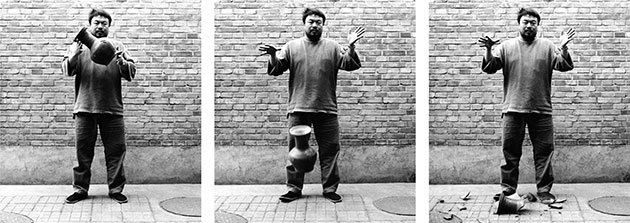Ai Weiwei
Chinese artist
aiweiwei.com
Ai Weiwei is a Chinese contemporary artist and activist. His father’s original surname was written Jiang. Ai collaborated with Swiss architects Herzog & de Meuron as the artistic consultant on the Beijing National Stadium for the 2008 Olympics. Wikipedia
Born: August 28, 1957 (age 60), Beijing, China
Artworks: Circle of Animals/Zodiac Heads, Sunflower Seeds
On view: Ullens Center for Contemporary Art
Periods: Conceptual art, Contemporary art, Excessivism
Spouse: Lu Qing
Structures: Beijing National Stadium, Serpentine Galleries
Children: Lao Ai

China’s censorship can never defeat the internet
Chairman Mao used to say: “As communists we gain control with the power of the gun and maintain control with the power of the pen.” You can see propaganda and the control of ideology as an authoritarian society’s most important task. Before the internet, all people could do was watch TV or read the People’s Daily. They would carefully read between the lines to see what had happened. Now it is very different. The papers try to talk about things, but even before they appear, everyone has talked about it on the internet.
I still think Gorbachev’s revolution in Russia – glasnost – was more important. Openness and transparency are the only way to limit these dark powers. Chinese citizens have never had the right to really express their opinions; in the constitution it says you can, but in the real world it is more dangerous. In the west people think it’s a right they’re born with. Here it’s a right given by the government, and one that’s not really practised.
Even though we had reform and opening, “opening” didn’t mean “openness”; it meant opening the door to the west. It was more practical than ideological. At the very beginning, nobody – even in the west – could predict the internet would have so much to do with freedom of speech and that social media would develop in the way it has. They just understood it was a more efficient, fast and powerful means of communication.
But since we got the net and could write blogs – and now microblogs – people have started to share ideas, and a new sense of freedom has arisen. Of course, it varies from silly posts about what you’ve had for breakfast to serious discussions of the news but, either way, people are learning how to exercise their own rights. It is a unique, treasured moment. People have started to feel the breeze. The internet is a wild land with its own games, languages and gestures through which we are starting to share common feelings.
But the government cannot give up control. It blocks major internet platforms – such as Twitter and Facebook – because it is afraid of free discussion. And it deletes information. The government computer has one button: delete.
Advertisement
But censorship by itself doesn’t work. It is, as Mao said, about the pen and the gun. At midnight they can come into your room and take you away. They can put a black hood on you, take you to a secret place and interrogate you, trying to stop what you’re doing. They threaten people, your family, saying: “Your children won’t find jobs.”
Yet, at the same time the government talks about how to make national culture strong and creative. Of course, if a person has never had the right to choose their information, freely associate with any kind of ideology, and develop an individual character with some passion and imagination – how can they become creative? It is against human nature. If you are against every essential value of individualism and independent thinking, and the willingness to take risks and bear consequences, and have a sense of responsibility – what kind of creativity do you expect?
It’s putting this nation far behind in the world’s competition in the coming decades. You can’t create generations just to labour at Foxconn. Everyone wants an iPhone, but it would be impossible to design an iPhone in China because it’s not a product; it’s an understanding of human nature.
But without censorship, I think it would be much less interesting. Trying to find possibilities through the difficulties can make life more interesting. I often see my cats put their toys in an area littered with obstacles, and their play becomes interesting and dramatic.
Censorship is saying: “I’m the one who says the last sentence. Whatever you say, the conclusion is mine.” But the internet is like a tree that is growing. The people will always have the last word – even if someone has a very weak, quiet voice. Such power will collapse because of a whisper.
When I was young I became rebellious. My hair got longer and, right before I was about to cut it, my parents said: “Cut your hair: it’s too long”. So then I thought I would keep it for a while, and it became very long. A whole generation of young people are like that now – different from the values of their parents, who just wanted to survive and make money.
China may seem quite successful in its controls, but it has only raised the water level. It’s like building a dam: it thinks there is more water so it will build it higher. But every drop of water is still in there. It doesn’t understand how to let the pressure out. It builds up a way to maintain control and push the problem to the next generation.
It still hasn’t come to the moment that it will collapse. That makes a lot of other states admire its technology and methods. But in the long run, its leaders must understand it’s not possible for them to control the internet unless they shut it off – and they can’t live with the consequences of that. The internet is uncontrollable. And if the internet is uncontrollable, freedom will win. It’s as simple as that.

Whaddaya Say?